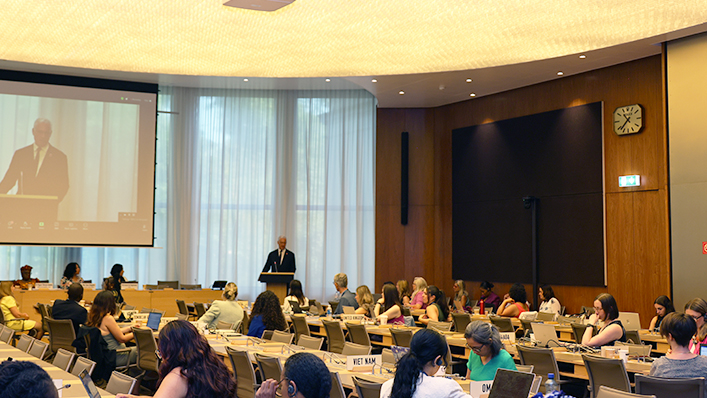
The Informal Working Group on Trade and Gender (IWG) met on 8 October to discuss its 2025–2026 Work Plan and review the implementation roadmap that will guide its gender equality initiatives leading up to the 14th WTO Ministerial Conference (MC14) in Cameroon, March 2026. The roadmap outlines concrete steps to integrate gender considerations into trade policies, enhance gender-disaggregated data analysis, and strengthen the technical capacity of government officials.
During the session, IWG members discussed preparations for MC14, including the co-chairs’ joint statement, a compendium summarizing the group’s work since 2020, and a planned joint event with the Informal Working Group on Micro, Small and Medium-sized Enterprises (MSMEs). The meeting also welcomed Ambassador James Baxter of Australia as a new co-chair, joining Ambassadors Clara Delgado (Cabo Verde) and Patricia Benedetti (El Salvador).
Several countries shared national updates. South Korea presented its Second Basic Plan for Facilitating Activities of Female-Owned Businesses (2025–2029), focusing on women’s participation in high-growth sectors and start-ups. China announced its upcoming Global Women’s Summit and a new white paper highlighting women’s economic empowerment efforts. Mongolia and Nigeria provided updates on the Women Exporters in the Digital Economy (WEIDE) Fund, which supports women-led MSMEs through funding, training, and mentorship to enhance export readiness and digital capabilities.
International organizations also contributed. The World Customs Organization (WCO) outlined initiatives promoting gender equality and diversity in customs operations, while the OECD presented its Trade and Gender Review of Latin America, revealing persistent gender gaps in export participation. UNCTAD shared insights from its study Breaking Down Barriers for Women Digital Entrepreneurs, emphasizing the need for targeted policies to improve women’s access to finance, networks, and global digital markets.
Potential Benefits to African Trade:
The IWG’s 2025–2026 roadmap and related gender initiatives hold significant promise for advancing inclusive trade across Africa. By mainstreaming gender equality in trade policy, the framework encourages women’s greater participation in regional and international commerce, strengthening the continent’s competitiveness under the African Continental Free Trade Area (AfCFTA).
Initiatives like the WEIDE Fund, active in Nigeria, are already helping women-led SMEs integrate into digital and export markets, improving access to finance, technology, and global networks. This can boost intra-African trade, foster innovation, and generate employment in emerging sectors such as e-commerce, fintech, and Agritech.
Furthermore, gender-responsive trade policies and training programs enhance economic resilience, ensuring that women entrepreneurs are not left behind in global value chains. Collaboration between African governments, international partners, and organizations like the WTO, UNCTAD, and WCO will be key to unlocking these opportunities. In the long term, such efforts can lead to more diversified, inclusive, and sustainable trade growth—positioning Africa as a leader in gender-responsive trade development.
